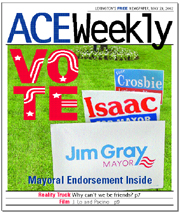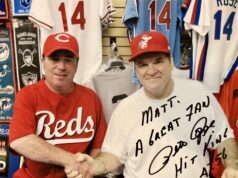Ace May 16, 2002
Jim Gray for Lexington Mayor
A pessimist thinks things can’t get any worse. An optimist knows they can.
-No Man’s Land
 As Bill Maher put it, “everyone says we’re too cynical,” adding, “No we’re not. We’re too stupid.” (He said it in his HBO special; the network canceled him.)
As Bill Maher put it, “everyone says we’re too cynical,” adding, “No we’re not. We’re too stupid.” (He said it in his HBO special; the network canceled him.)
We celebrate mediocrity and champion the unremarkable every chance we get. (Box office returns, CD sales, and the composition of Congress confirm this beyond a shadow of a doubt.)
Occasionally, we get a glimpse of something, or somebody, better.
In debating Ace’s endorsement for mayor, one of our contributing writers said of Jim Gray, “I don’t know quite how to put this, but he’s the only one who seems to know Lexington could be something.”
In a word, she was talking about that ineffable quality that (like pornography) we can’t exactly define, but we know it when we see it: vision.
It’s been trotted out by his campaign. The daily paper has cited it as one of his chief assets (which it is).
It’s also not a word that does him any favors, much less justice.
“Vision” brings with it the baggage that perhaps bankers have coined the best synonym for, which is “blue sky.” It’s the phrase they use to tag the speculative or suspect part of any venture or business plan.
Jim Gray’s vision for Lexington is far more tangible and concrete. He may not be a career politician, but he’s not new to government or politics.
As one of many examples, he ably served as chair of the Governor’s Task Force on Smart Growth–a title that indicates Gray is aware that “smart growth” is not an oxymoron.
The Economic Development Committee report issued in September of last year included copious detail on solving problems that are directly applicable to Lexington, such as incentives for infill redevelopment; infrastructure; and preservation and conservation of historic, natural and agricultural lands.
Gray seems to understand Lexington’s growing pains as it struggles to figure out whether it’s a small city or a big town.
He’s also smart (not to be confused with well-educated, though he’s that too). It’s an advantage that might not be prized in today’s political climate, but it would serve him well on the job.
The assets he brings to the table from the business world haven’t been adequately conveyed by his campaign in terms of the transferable skills he would bring to the position of mayor (the “treating citizens like customers” series tried, but missed the mark). In fact, if he emerges as one of the top two on Tuesday (which seems likely), it may well be in spite of his campaign, rather than because of it -something that would have to be remedied long before November if he is to become mayor.
If this were Dallas (the show and not the city), he’s obviously far more Bobby than J.R. And if that’s part of his charm (and electability), he might as well go with it. (The few negative ads from his campaign were unbecoming, but more importantly, they were an anemic, pointless waste of time and money.)
It’s true that pessimists enjoy the luxury of never being disappointed, but they also don’t try very hard. Gray isn’t afraid to think big. Big ideas. Big goals. Even if he falls 50 percent short, he’s still vastly ahead of the rest of the pack.
There’s the undeniable factor that success in business doesn’t necessarily translate to success in politics (see also, Ross Perot), but there are plenty of captains of industry who’ve made the leap-precisely because success in both usually requires definitive abilities in leadership, analysis, efficiency, and solving problems (though we all know the exceptions that prove the rule, in both arenas).
The mayor’s office is an executive’s job, and that’s a job he knows.
Even still, his staunchest advocates admit that his success in business and lack of elected experience could be his biggest liabilities. A successful corporation is, fundamentally and structurally, a dictatorship, whereas politics requires, wellpolitics.
The transition from the for-profit world to guv-mint can be a frustrating one. Everything requires a committee. Consensus can be a necessary nightmare, even when it’s never the shortest distance between two points. Inherited staffing can be nepotistic and legally dug in. And change is almost never achieved quickly or effectively enough to suit the average voter.
The Herald-Leader endorsement wisely advises that he “will need an excellent detail person and administrative team.”
By and large, this will be the camp that might have the ridiculous task of, say, explaining to him, “Yes Jim, we could save $20,000 a year if we bought the toilet paper at Sam’s Club, but the city already has a contract with…..”
The good thing is, he catches on fast, and nobody will have to tell him anything twice. He’ll change what can be changed for the better, without wasting a lot of time on the windmills.
Although money and politics are two topics most likely to get you kicked out of any dinner party (with religion a close third), the size of Gray’s war chest has been widely addressed, and criticized by detractors. Still, the funds were raised honestly, and the budget was proportionate to the job that had to be done. (As they condescendingly put it on Wall Street, “a fool and his money were lucky to ever get together in the first place.” It’s as true of politics as it is of commerce, and by that yardstick, it’s clear that Gray is nobody’s fool. It was hard to find a single evening this spring that wasn’t host to a Jim Gray fundraiser.)
His supporters have been labeled among the young and “trendy” downtown set, but it’s equally true that you can’t swing a dead cat in Ashland Park or Chevy Chase without hitting one of his yard signs-neighborhoods that are about as sociopolitically traditional as they come in this town.
Although this is a primary field with some genuine assets-most specifically a combined lengthy history of public service and elected office-Gray emerges as the best choice.
Candidate Ann Ross rightly observes that the race for mayor shouldn’t be bought. But it’s not necessarily cynical to conceive that this might bespeak a fundamental naiveté (speaking of windmills). Maybe the average consumer doesn’t want to know how the sausage gets made–but the guy who runs the grinder better have a good idea.
Teresa Isaac’s supporters are vocal about their desire for a candidate who will answer “every phone call.” That’s a great trait in many jobs (we’d certainly vote for it in a cable company employee), and yet we presume that if every elected official returned the phone calls of every wackadoo, or constituent, with an opinion, the business of government would grind to a screeching halt.
And Scott Crosbie — while owning the town’s far right — has occasionally seemed flummoxed as to what the job description actually is, despite four (largely unremarkable) years as a council member.
Anybody who’s going to run a merged urban county government with a staff in the thousands and a budget of more than $300 million has to know the town and the job like the back of their hand.
And Gray, with his longtime legacy of corporate success, civic commitments, forged partnerships, and intellectual bent, is the best in the field.
WHAT ACE AND ACE READERS HAVE SAID
In September 2001, Ace Weekly’s readers voted Scott Crosbie “the best local politician you most love to hate” in a come-from-behind victory in Ace’s annual Best of Lexington readers’ poll. (In 2000, he only placed third, well behind the victor, Ernie Fletcher, and number two vote-getter, mayor Pam Miller.)
In a 1998 interview with Ace, Jim Gray was interviewed by Rob Hulsman in a cover story about UK’s eminent domain.
At the time, Gray responded, “Instead of re-development, [UK] is talking about new bricks and mortar ” adding, “Downtown is the heart and heartbeat of the city. Downtown is only going to thrive if the vitality of the academic community is felt; it’s an enormous resource.”
(With Lee Todd as the current UK president, it’s likely that the town-gown relationship will improve vastly)
In the article, Hulsman characterized Gray Construction’s rehab of Wolf Wiles as “a virtual monument to the concept of responsible infill,” adding, “The project is a model of what is possible for downtown’s and Lexington’s future.”
(In Ace’s1997 inaugural readers’ poll, Gray Construction placed second in the poll for “Best Renovation/Rehabilitation of an historic structure.” The Opera House won the category.)
In a November 1999 Ace Magazine article on the Kentucky Theatre’s “controversial” showing of Disco Dolls, writer Bob Campbell took Scott Crosbie to task for “grandstanding,” but the bulk of his article was devoted to Campbell’s thesis, “applying a blanket rebuttal of First Amendment violations causes the liberal to argue in as shallow a pool as the conservative.”
In the 1998 congressional primary, Ernesto Scorsone was endorsed by Ace, but Teresa Isaac’s candidacy was also thoroughly explored (along with her record of standing up for underserved populations), and the endorsement concluded with, “Scorsone’s lengthy record of achievements and accomplishments make him the best choice, but we certainly wouldn’t shed any tears if Kentucky managed to put another woman in Washington come this Fall.”
Ann Ross was elected to the urban county council in 1978, and went on to serve as vice-mayor. Though she has since continued a distinguished career of public service, Ace wasn’t founded until 1989, and no political record of her surfaces in Ace Magazine (1989-2000) or Ace Weekly (2000-present).
YOU MIGHT ALSO LIKE
The Twitter Transparency Era Begins at LFUCG, Ace May 2009
Hoodwinked: Vice Mayor Jim Gray’s Tuesday Night Showdown at LFUCG, Ace May 6, 2009
Jim Gray admits he didn’t have a crystal ball, just an ability to read a newspaper, Ace May 6, 2009
This Year’s Model (Citizens) 2008, Jim Gray Ace December 2008







